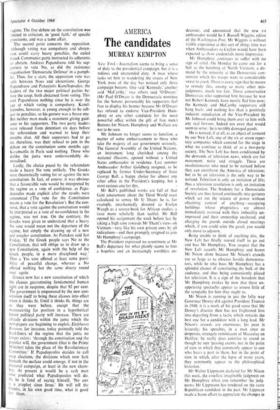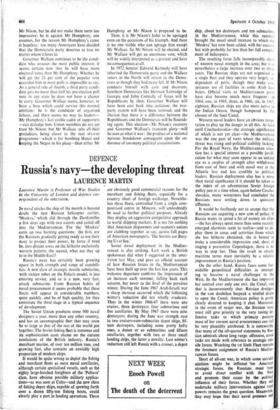The candidates
AMERICA MURRAY KEMPTON
New York—Journalism seems to bring a sense of duty to the presidential campaign, but it is a tedious and unattended duty. A man whose tasks set him to wandering the streets of New York most of the day has noticed only three campaign buttons. One said `Kennedy.' another said `McCarthy,' two others said `O'Dwyer.' (Mr Paul O'Dwyer is the Democratic nominee for the Senate; presumably his supporters feel free to display his banner because Mr O'Dwyer has refused to endorse Vice-President Hum- phrey or any other candidate for the most powerful office within the gift of free men.) Buttons for Nixon, Humphrey and Wallace are - not to be seen.
Mr Johnson no longer seems to function, a matter of some embarrassment to those who take the majesty of our government seriously. The General Assembly of the United Nations, an instrument long cherished among the national illusions, opened without a United States ambassador in residence. Last summer Ambassador Arthur Goldberg resigned, to be replaced by former Under-Secretary of State George Ball, a happy choice for almost any other office in the President's keeping, but a
most curious one for this. A
Mr Ball's published works are full of that faint amusement about the Third World most calculated to annoy Mr U Thant; he is, for example, unashamedly devoted to Evelyn Waugh as a source-book for African studies, a taste more scholarly than tactful. Mr Ball opened his assignment the week before last by taking a high tone towards Mr Thant's views on Vietnam—very like his own private ones by all indications—and then promptly resigned to join Mr Humphrey's campaign.
The President expressed no resentment at Mr Ball's departure for what plainly seems to him a hopeless and an increasingly worthless en- deavour, and announced that the new UN ambassador would be J. Russell Wiggins, editor of the Washington Post. Mr Wiggins is without visible experience at this sort of thing; time was when Ambassadors to Ceylon would have been expected to show credentials more impressive.
Mr Humphrey continues to suffer with no sign of relief. On Monday he came out for a halt to the bombing of North Vietnam, a de- mand by the minority at the Democratic con- vention which his troops went to considerable sweat to crush. There is every sign that he moves to remedy this, among so many other mis- judgments, much too late. Those conservative Democrats who supported him because he was not Robert Kennedy have mostly fled him now; the Kennedy and McCarthy supporters still hang back; and nothing less than a positively indecent repudiation of the Vice-President by Mr Johnson could bring them over to him with any real fervour. Indeed not even that would seem to serve : he is terribly damaged goods.
He is noticed, if at all, as an object of torment by our New Left, one of the six or seven reper- tory companies which contend for the stage in what we continue to think of as a two-party society. The New Left has been conditioned by the demands of television news, which are for movement, noise and struggle. These are revolutionaries who need to be noticed before they can overthrow the America of television; but to be on television is the only way to be noticed. Television is only an imitation of life; thus a television revolution is only an imitation of revolution. The Students for a Democratic Society are thus forced continually into gestures which act out the seizure of power without obtaining control of anything—occupying buildings whose ptoprietors are almost immediately restored with their imbecility un- improved and their ownership unaltered, and charging the guards outside closed meetings which, if you could seize the gavel, you would only move to adjourn.
Being unable to think of anything else, the New Left has finally roused itself to go out
and boo Mr Humphrey. You suspect that the New Left assaults Mr Humphrey and leaves Mr Nixon alone because Mr Nixon's crowds are so large as to obscure hostile demonstra- tors, while he who boos Mr Humphrey has a splendid chance of constituting the bulk of the audience, and thus being conveniently placed for television. It is a sign of the boredom that Mr Humphrey evokes by now that these un- appetising spectacles appear to arouse little of the sympathy for him they ought to.
Mr Nixon is running in just the lofty way Governor Dewey did against President Truman
in 1948; it is a mark of his good sense that Mr Dewey's disaster then has not frightened him into departing from a tactic which remains the best one for a candidate with a long lead. Mr Nixon's crowds are enormous; his pace is leisurely; his speeches, in a man once so desperate, strangely reminiscent of Macaulay on Halifax; he really does contrive to sound as though he sees 'passing events, not in the point of view in which they commonly appear to one who bears a part in them, but in the point of view in which, after the lapse of many years, they commonly appear to the philosophical historian.'
Mr Walter Lippmann declaied for Mr Nixon this week, the cruellest imaginable judgment on Mr Humphrey when you remember the judg- ments Mr Lippmann has rendered on the same Republican candidate in the past. Mr Lippman made a brave effort to appreciate the changes in
Mr Nixon, but he did not make them seem too impressive; he is against Mr Humphrey, one assumes, for the reason Mr Humphrey's cause is hopeless: too many Americans have decided that the Democratic party deserves to lose no matter whom it loses to.
Governor Wallace continues to be the candi- date who arouses the most public interest; it seems certain now that he will have more electoral votes than Mr Humphrey. Whether he will get the 21 per cent of the popular vote accorded him in most polls is impossible to say. As a general rule of thumb, a third party candi- date gets no more than half his pre-election poll vote in any state he does not have a chance to carry. Governor Wallace seems, however, to have a base which could survive this normal attrition: he is the candidate of organised labour, and there seems no way its leaders— Mr Humphrey's last visible cadre of supporters —can dislodge him. Union members do not yet trust Mr Nixon; but Mr Wallace ;nits all their prejudices, being closer to the real AFL-CIO programme—which is for bombing Hanoi and keeping the Negro in his place—than either Mr
Humphrey or Mr Nixon is prepared to be.
Then, it is Mr Nixon's habit to.be upstaged even on the occasions of his triumph. And there is no one visible who can upstage him except Mr Wallace. So Mr Nixon will be elected, and Mr Wallace will get an enormous vote, which will be widely interpreted as a portent and have no consequences at all.
In 1972 Senator Edward Kennedy will have inherited the Democratic party and the Wallace voters in the North will return to the Demo- crats as though they had never left. If Mr Nixon conducts himself with care and decorum, Southern Democrats like Herman Talmadge of Georgia and John Connally of Texas will be Republicans by then. Governor Wallace will have been cast back into isolation; the two- party system will have been restored; and the illusion that there is a difference between the Republicans and the Democrats will be flourish- ing again. This election—Mr Nixon's recovery and Governor Wallace's transient glory—will be seen as what it was: the product of a national nervous breakdown consequent upon the en- durance of too many political assassinations.







































 Previous page
Previous page